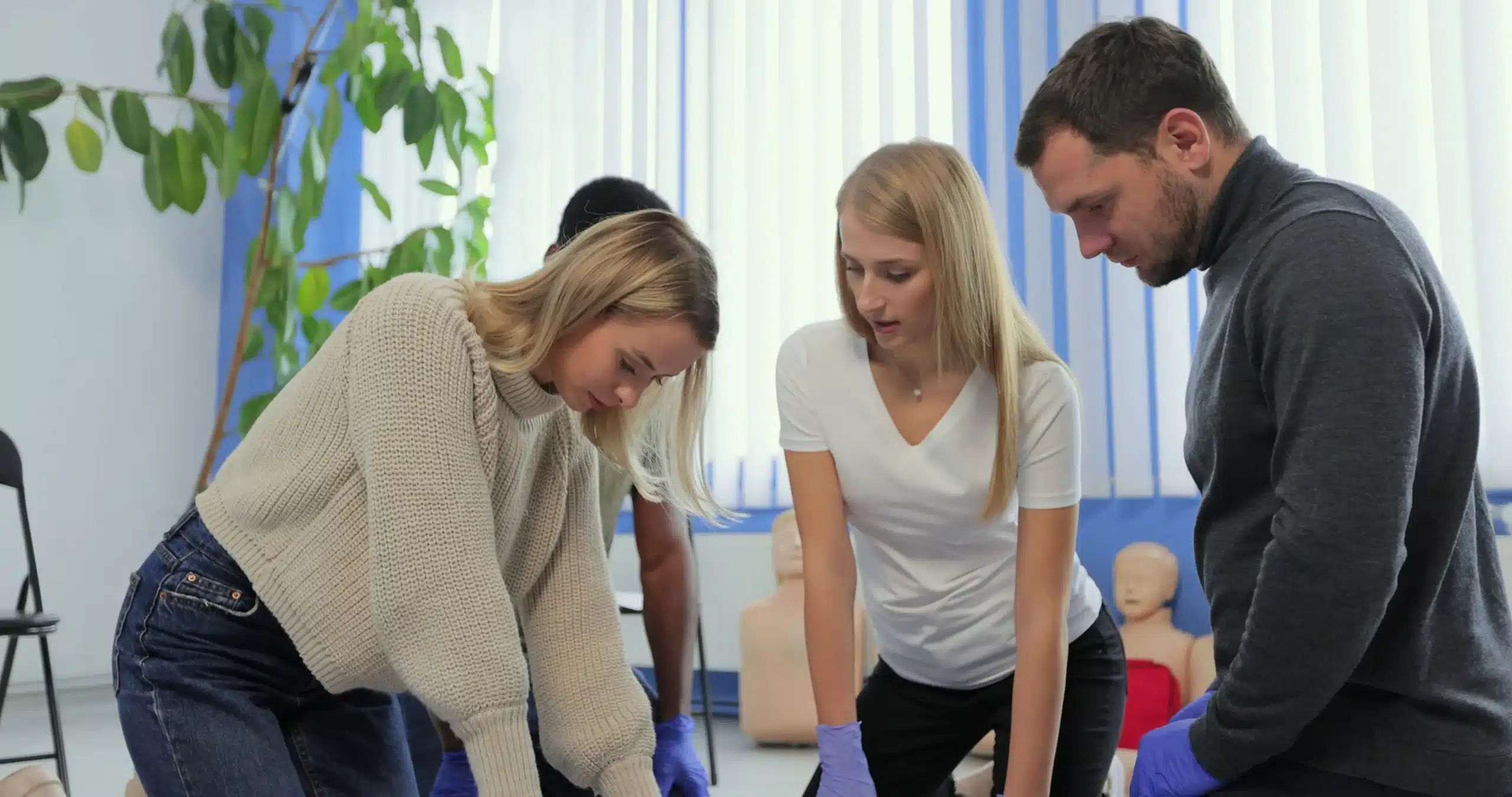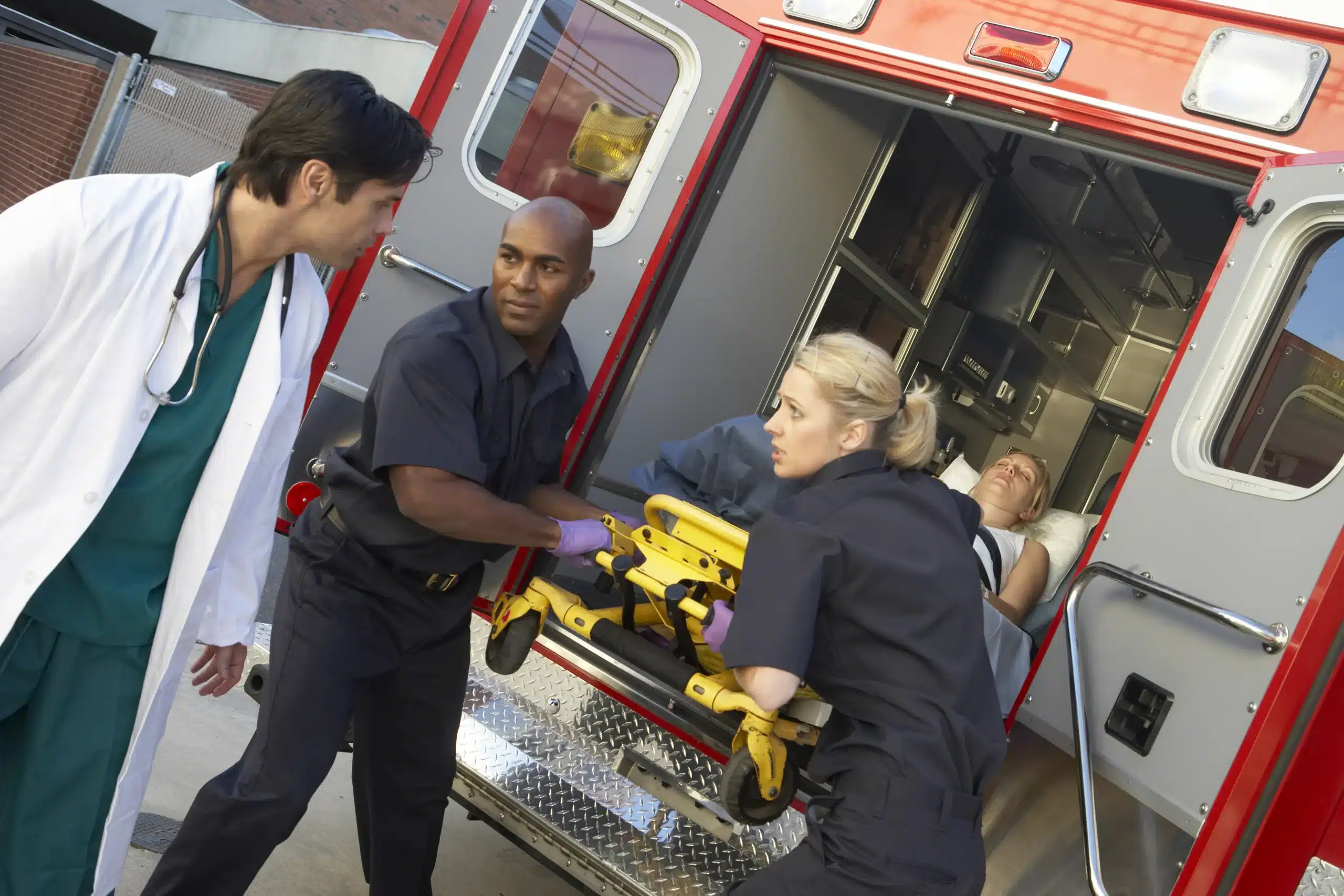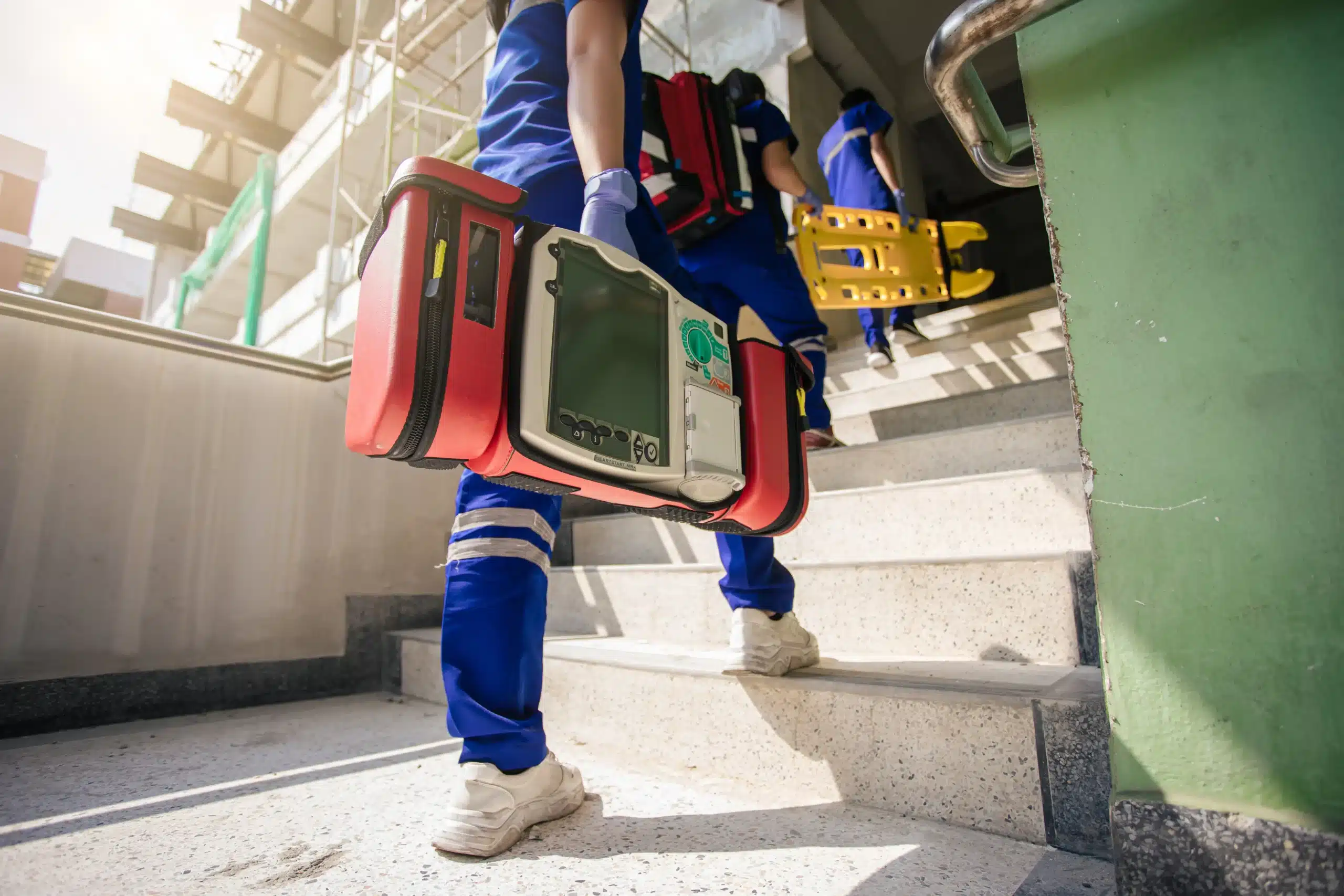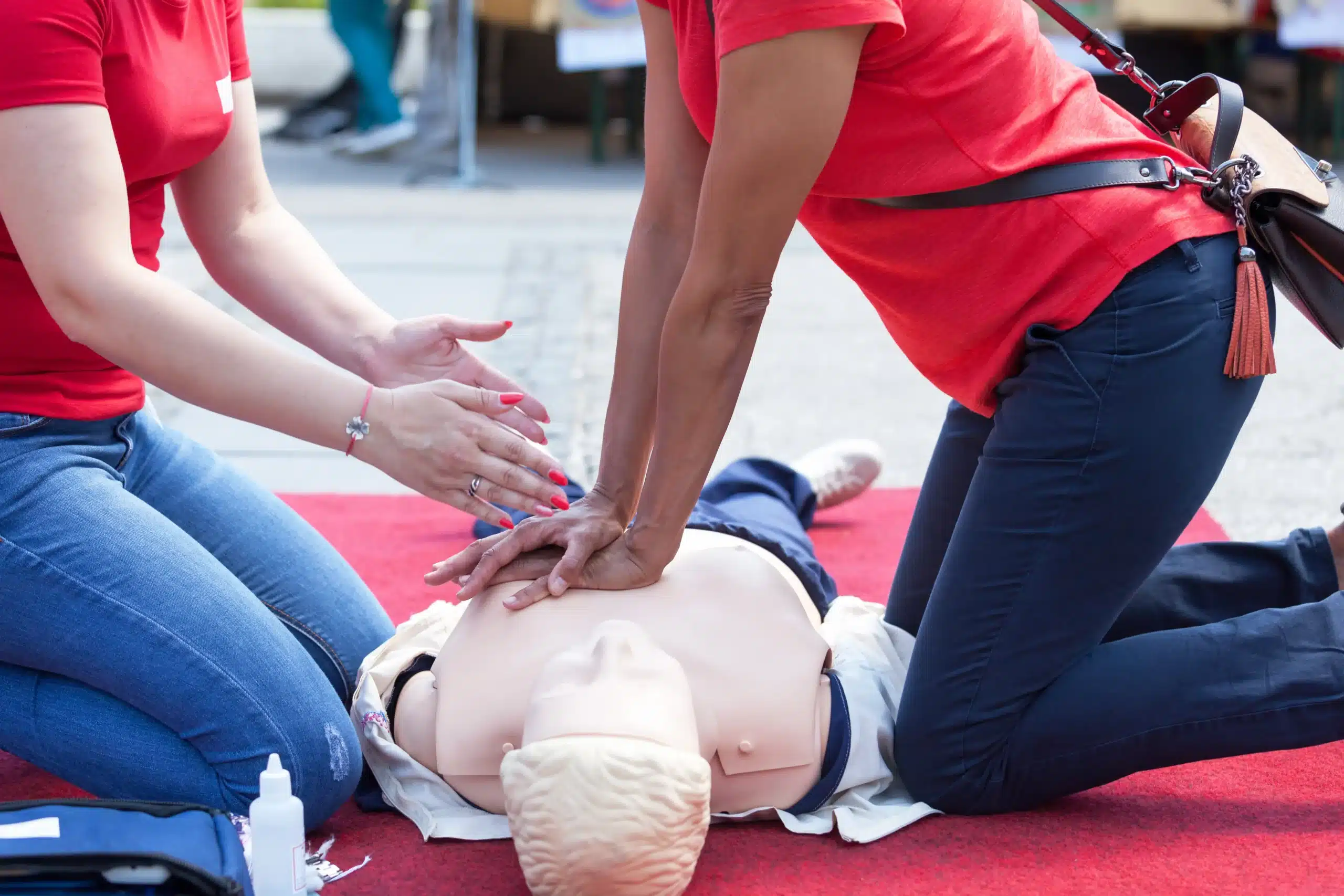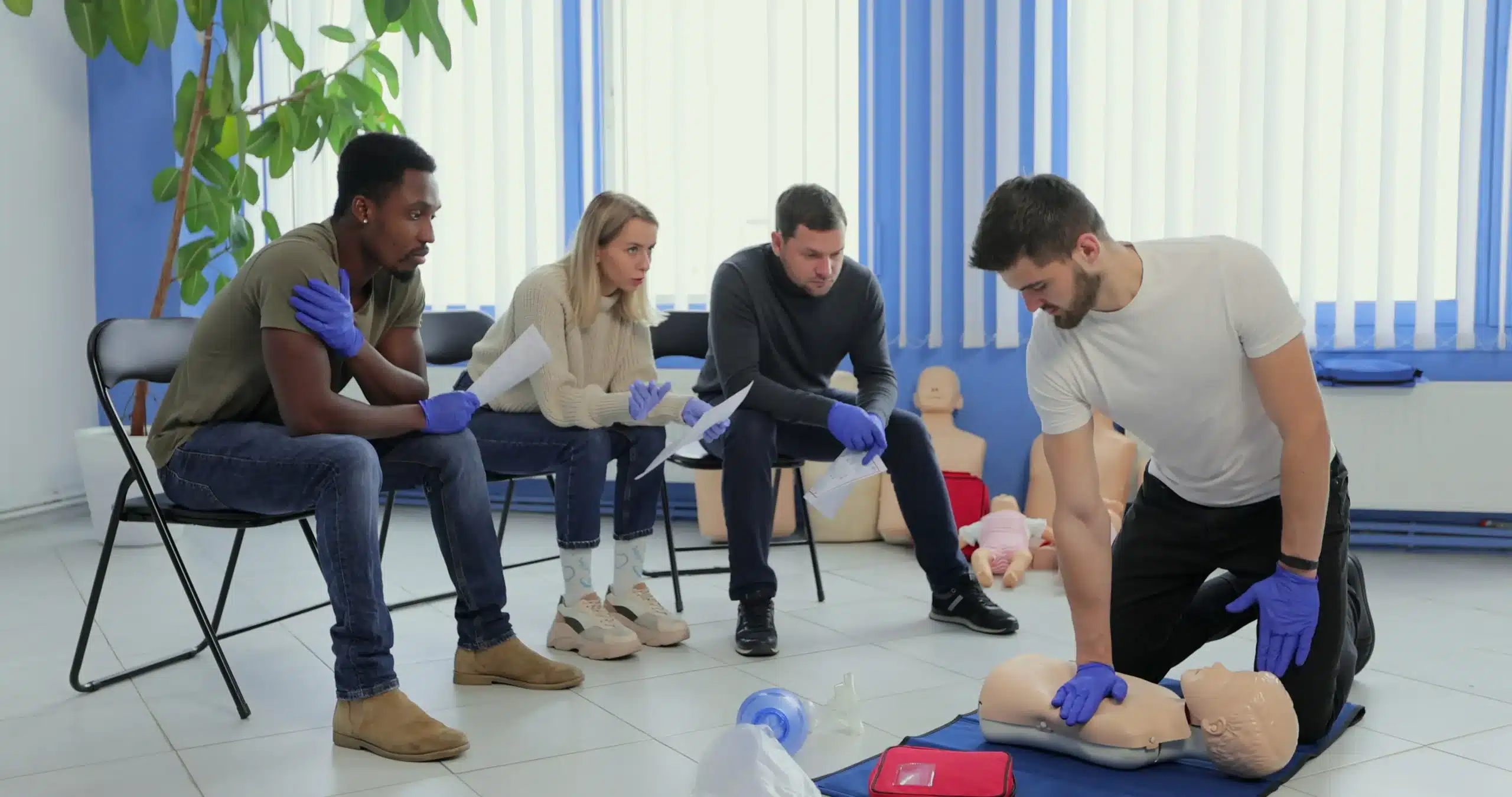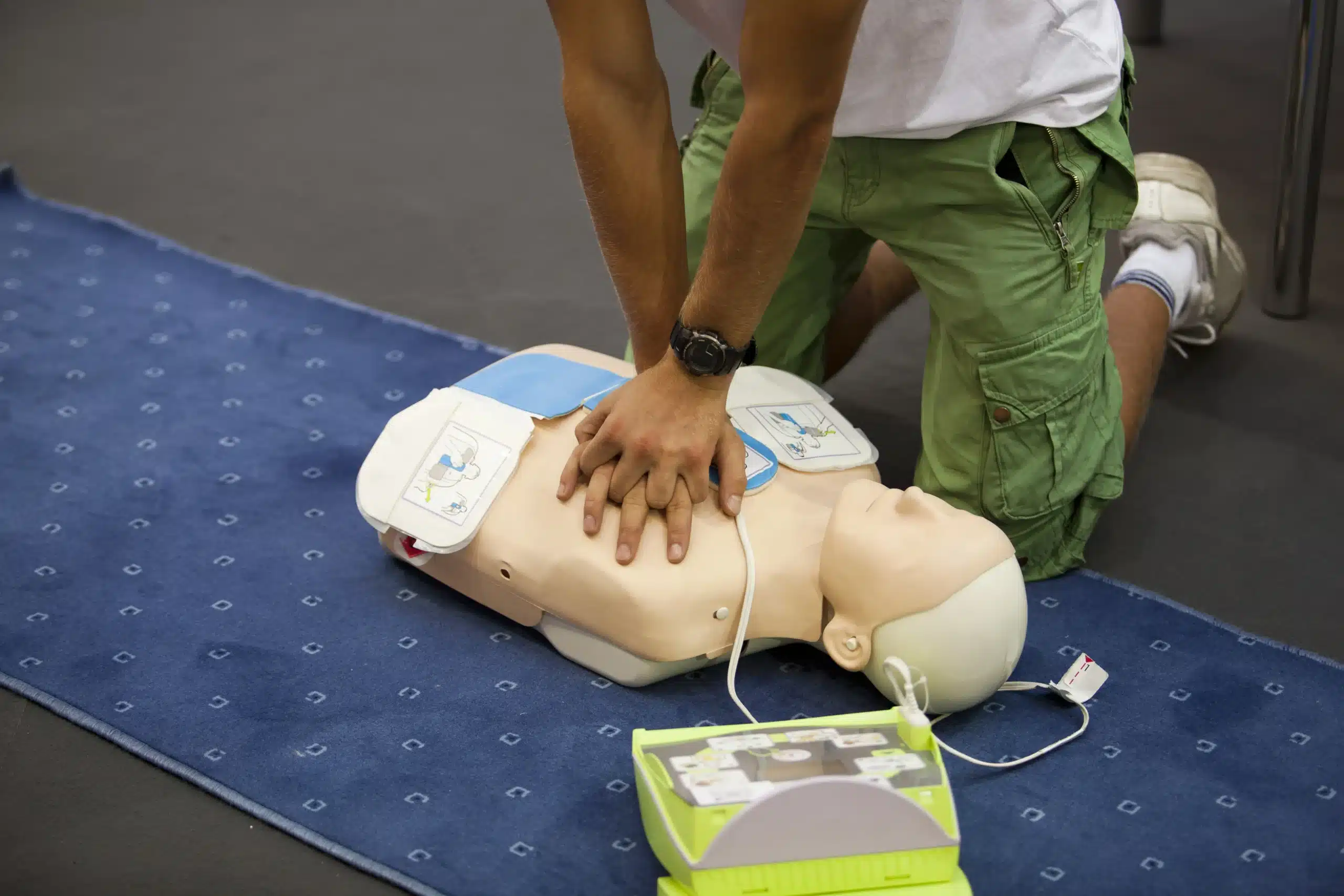Emergencies can happen anytime, anywhere. Would you know what to do if someone near you experienced a medical crisis? CPR training provides the skills and knowledge to respond effectively, potentially making the difference between life and death. This article focuses on CPR courses in Benicia, exploring the various options available to residents and highlighting the importance of being prepared in a city with unique waterfront risks. We’ll cover everything from basic CPR and First Aid to specialized certifications like BLS and PALS, along with where to find training and how to choose the right course for your needs.
Key Takeaways
- CPR skills are essential for Benicia residents: Given the city’s proximity to water, being prepared for emergencies is crucial. Find a local CPR class that fits your needs, whether it’s a basic community course or a more advanced certification.
- Choose the right CPR course format: Explore options like in-person training, online certification, or hybrid courses that blend online learning with in-person skills sessions. Consider your schedule and learning preferences when selecting a course.
- CPR certification has lasting benefits: Being certified prepares you to respond confidently in emergencies, potentially enhancing your career and contributing to a safer community. Remember to stay up-to-date with the latest guidelines to maintain your skills.
What is CPR and Why is it Important in Benicia?
CPR, or cardiopulmonary resuscitation, is a lifesaving technique used when someone’s heartbeat or breathing has stopped. It involves chest compressions and rescue breaths to circulate oxygenated blood to the brain and other vital organs. Learning CPR empowers you to respond effectively during emergencies and can significantly improve a victim’s chances of survival.
In Benicia, with its unique waterfront location, the importance of CPR knowledge is amplified. The proximity to water activities increases the risk of drowning, making CPR skills particularly valuable. Benicia CPR training classes often highlight these specific risks. Even in non-water-related emergencies, CPR can be crucial. Quick access to emergency medical services can be limited depending on traffic or location, so immediate CPR can make all the difference while waiting for paramedics. The City of Benicia emphasizes the importance of public CPR education for this very reason.
Studies show that performing Hands-Only CPR can double or even triple a person’s chance of survival. This simplified version of CPR, focusing solely on chest compressions, is easy to learn and highly effective. Every year, countless Americans experience sudden cardiac arrest. Learning CPR, whether traditional or Hands-Only, provides a critical bridge of life support until professional help arrives, as explained in this CPR AED course overview. By becoming CPR certified, you not only gain the ability to assist in emergencies but also contribute to a safer and more prepared community in Benicia.
CPR Courses in Benicia
Benicia offers a variety of CPR courses to suit different needs, from basic life support for the community to advanced certifications for healthcare professionals. Let’s explore some of the options available:
BLS for Healthcare Providers
The Basic Life Support (BLS) course is a cornerstone for healthcare providers. This certification covers essential life-saving techniques, including CPR, using an AED (automated external defibrillator), and relieving choking. BLS certification is typically required for professionals like doctors, nurses, paramedics, and other healthcare workers. The training emphasizes high-quality CPR and effective team dynamics during medical emergencies. For those seeking BLS certification in the Martinez area, Martinez CPR Classes offers BLS courses aligned with American Heart Association guidelines.
CPR/AED for the Public
Designed for anyone interested in learning CPR, the CPR/AED for the Public course empowers individuals to respond confidently during emergencies. This course teaches basic CPR skills and how to use an AED, making it ideal for community members, teachers, coaches, and anyone who wants to be prepared to help. Even without formal medical training, you can make a difference. CPR Education provides CPR/AED training for the public in Benicia.
First Aid & CPR
Combining CPR training with essential first aid knowledge provides a well-rounded skill set for handling various emergencies. These combined courses often cover treating common injuries like cuts, burns, and sprains, along with recognizing and responding to medical emergencies like heart attacks and strokes. This comprehensive approach prepares you to provide immediate assistance in a wider range of situations. Check with your local training providers, such as CPR Education, for combined First Aid and CPR courses.
PALS
Pediatric Advanced Life Support (PALS) focuses on the specific needs of infants and children during medical crises. This advanced certification is crucial for healthcare providers working in pediatrics, emergency medicine, and intensive care units. PALS training covers advanced airway management, recognizing and treating pediatric respiratory and cardiac emergencies, and effective team dynamics in high-pressure situations. For more information on PALS certification in Benicia, you can explore resources like this PALS Certification Guide.
Hands-Only CPR
Hands-Only CPR is a simplified technique that focuses on chest compressions for individuals who witness a sudden cardiac arrest. This method can be incredibly effective in maintaining blood flow to the brain until professional help arrives. The City of Benicia offers free Hands-Only CPR classes to the public, making this life-saving skill accessible to everyone. Check the City of Benicia website for class schedules and registration.
Where to Find CPR Training in Benicia
Finding the right CPR class can feel overwhelming, but several excellent resources are available in and around Benicia. Here are a few places to start your search:
Martinez CPR Classes
Martinez CPR Classes offers a variety of American Heart Association (AHA) courses, including BLS, ACLS, PALS, CPR, and First Aid. They’re known for their commitment to affordability and offer discounts for group registrations, which is helpful if you’re coordinating training for a workplace or a group of friends. They serve Martinez, Port Chicago, and Benicia.
AHA Training Centers
Searching online for “AHA Training Centers” near Benicia will point you to other certified providers in the area. Martinez CPR Classes is a woman-owned AHA Training Center offering a range of courses, including BLS, ACLS, PALS, CPR, and First Aid. This broad search can be a good starting point if you’re looking for a specific type of certification or course format.
Benicia Fire Department
Many local fire departments, including the Benicia Fire Department, periodically offer CPR and AED training. Check their website or social media pages for class schedules and registration details. These community-based courses are often a convenient way to learn CPR.
CPR Education
CPR Education provides a range of CPR and First Aid training in Benicia. They offer courses such as BLS for Healthcare Providers, CPR/AED for the general public, and workplace First Aid. They also provide more specialized training like Bloodborne Pathogens and infant CPR.
Benicia CPR Training Center
The Benicia CPR Training Center is another option for AHA-authorized courses. They offer a comprehensive selection of CPR and advanced life support training, including BLS, ACLS, and PALS.
CPR Course Costs & Accessibility
Finding the right CPR class often involves balancing cost with convenience and quality. Let’s break down the typical costs associated with CPR training in Benicia and explore some ways to make it more affordable.
Course Costs
CPR course fees in Benicia vary based on the training provider, the type of certification, and the course format. For example, the Benicia Fire Department occasionally offers American Heart Association CPR & AED courses, with prices typically around $75. Check their Facebook page for upcoming course dates and registration information. Other providers also offer competitive rates for standard CPR certifications, including the American Heart Association BLS for Healthcare Providers, in the Benicia area. It’s always a good idea to compare pricing from a few different sources before registering for a class.
Discounts & Special Rates
If you’re looking to save on CPR training, keep an eye out for discounts. Martinez CPR Classes, serving the Benicia area, offers a low-price guarantee on their AHA-compliant courses, including BLS. They also provide group discounts, which can be a great option for businesses looking to train multiple employees. This can significantly reduce the per-person cost. Check with your employer or community group to see if they’ve partnered with any training centers for discounted rates.
Free CPR Training
While most CPR certification courses come with a fee, there are some opportunities to learn CPR for free. Community programs sometimes offer complimentary CPR classes, although these may not always provide a formal certification. These free courses are a fantastic way to gain basic life-saving skills. Check with local community centers, hospitals, or non-profit organizations for information on free CPR training opportunities in Benicia. While free courses are a valuable resource, if you need official certification for your job, you’ll likely need to enroll in a paid course.
Course Formats & Duration
Finding the right CPR class often depends on your schedule and learning style. Luckily, several course formats are available in Benicia, offering flexibility for everyone. Let’s explore the options:
In-Person Training
In-person CPR training provides hands-on learning in a structured environment. These courses, offered by authorized providers like the Benicia CPR Training Center, are led by experienced healthcare professionals. The in-person format allows direct interaction with instructors, real-time feedback, and practice with equipment like mannequins and AED trainers. This format is ideal for those who thrive in interactive learning environments and appreciate expert guidance. In-person training creates a low-stress environment for learning these essential skills.
Online CPR Certification
For busy schedules or limited access to in-person classes, online CPR certification offers a convenient alternative. Online courses cover the same core material as in-person training, allowing you to learn at your own pace. Many providers, including Martinez CPR Classes, offer online options, often combined with in-person skills checks for certification. This blended approach provides flexibility while ensuring you receive practical training.
Hybrid Courses
Hybrid courses combine online learning with in-person skills sessions. The BLS HeartCode program is a popular example. You’ll complete the cognitive portion online, then attend a shorter in-person session to demonstrate your skills and receive your certification. This format is perfect for those who enjoy online learning but still value hands-on practice and feedback.
Typical Course Lengths
The duration of a CPR course depends on the type and level of certification. Basic CPR classes typically last between two and four hours, while more comprehensive certification courses can range from four to eight hours. Courses that include first aid and AED training will naturally require more time. When choosing a course, consider the time commitment and select an option that fits your schedule and learning goals. Completing a CPR certification course results in an official certificate, validating your skills and knowledge.
Benefits of CPR Certification
Getting CPR certified offers several advantages, from personal preparedness to career advancement. It’s a valuable skill that can make a real difference.
Prepare for Emergencies
Learning CPR equips you with the knowledge and confidence to respond effectively during emergencies. Instead of feeling helpless, you’ll be prepared to take action and potentially save a life. CPR training provides the foundational skills needed to assess a situation and provide assistance until professional help arrives. As CPR Education points out, it’s the best way to prepare for an emergency.
Advance Your Career
For many healthcare professionals, CPR certification is a job requirement. Even if it’s not mandatory, having this credential on your resume can give you a competitive edge. BLS CPR classes, for example, offer in-depth training that can significantly enhance your qualifications. It demonstrates your commitment to patient care and your willingness to go the extra mile.
Improve Community Safety
CPR-trained individuals contribute to safer communities. When more people know how to perform CPR, the chances of someone receiving timely assistance during a cardiac emergency increase. Even learning Hands-Only CPR, a simplified technique promoted by the City of Benicia, can make a significant impact. It empowers individuals to help others and creates a network of potential lifesavers.
Increase Survival Rates
Studies show that performing CPR, especially Hands-Only CPR, can double or triple a victim’s chances of survival. This statistic highlights the critical role CPR plays in improving outcomes during cardiac arrest. Bystander intervention and prompt CPR can significantly increase the likelihood of survival until emergency medical services arrive.
Choose the Right CPR Course in Benicia
Finding the right CPR class can feel overwhelming, but breaking it down into a few key steps makes the process much easier. Think about your needs, research different providers, and consider the class format and schedule.
Assess Your Needs
Before you start searching for CPR training, ask yourself why you need this skill. Are you a healthcare professional requiring BLS certification? Do you need CPR training for your job at a daycare or summer camp? Or are you a parent wanting to learn CPR for peace of mind? Knowing your goals will help you choose the right course. For example, healthcare providers in Benicia will need a different class than someone fulfilling a workplace requirement. CPR Education offers a range of courses, from BLS for healthcare providers to CPR/AED training for the general public.
Evaluate Providers
Once you know what type of course you need, it’s time to research training providers. Look for certified instructors offering American Heart Association (AHA) courses. Check if the provider is reputable and offers high-quality instruction. Martinez CPR Classes offers a wide range of AHA-certified courses, including BLS, ACLS, PALS, and First Aid. Reading reviews and comparing prices can also help you make an informed decision. Consider factors like class size and instructor experience. A smaller class size often means more personalized attention. Learn more about Martinez CPR classes and their low price guarantee.
Consider Schedule & Format
Finally, think about your schedule and preferred learning style. Do you prefer in-person classes or the flexibility of online learning? Martinez CPR Classes offers daily courses accommodating various schedules. CPR Education also offers a mix of in-person and online options, including online BLS and ACLS renewal courses and daily online BLS skill checks. Consider what works best for your learning style and availability. If you have a busy schedule, an online or blended learning format might be a good fit.
Maintain Your CPR Certification
Keeping your CPR skills sharp is essential for providing effective assistance during emergencies. This section covers how to maintain your certification and stay up-to-date with the latest guidelines.
Renewal Requirements
To maintain your CPR certification, you’ll need to understand the renewal process. Your provider should offer several BLS renewal options, such as online self-paced courses, blended learning (a mix of online and in-person instruction), and traditional classroom settings. Find a format that works for your schedule and learning style. Generally, you’ll need a current (or recently expired) BLS certification to be eligible for a renewal course.
Stay Updated on Guidelines
Staying current with CPR guidelines is crucial for delivering effective, life-saving techniques. Regularly reviewing the latest practices and recommendations ensures you’re prepared to respond confidently in an emergency. The American Heart Association’s RQI program offers a modern approach for healthcare professionals to refresh their skills and maintain their certifications.
CPR Training’s Impact on Benicia
CPR training is crucial in Benicia, bolstering the community’s ability to respond effectively to emergencies and ultimately saving lives. The more residents equipped with these skills, the safer our city becomes.
Community Preparedness
Benicia residents have access to various CPR and first aid training resources. CPR Education offers a range of courses, including BLS for healthcare providers, CPR/AED for the public, standard First Aid, Bloodborne Pathogens training, and infant CPR. These courses equip individuals to handle a variety of emergency situations, from common injuries to life-threatening cardiac events. The City of Benicia also promotes community preparedness by offering free Hands-Only CPR classes, making this essential lifesaving skill accessible to all residents. A community well-versed in CPR creates a network of potential lifesavers ready to act when needed.
Faster Response Times
In medical emergencies, seconds matter. The faster CPR begins, the higher the survival rate. Equipping more Benicia residents with CPR skills establishes a network of immediate responders. This can drastically reduce the time it takes for a victim to receive help, especially when professional medical assistance might be delayed. The City of Benicia emphasizes that knowing Hands-Only CPR can double or triple a victim’s chance of survival. The Benicia CPR Training Center, an American Heart Association (AHA) authorized center, further supports this network by offering advanced life support courses such as BLS, ACLS, and PALS. These advanced certifications ensure healthcare professionals in Benicia are prepared to provide high-quality care in critical situations.
Get Started with CPR Training in Benicia
Ready to take a CPR class in Benicia? You’ve got some great choices, depending on your needs and goals. Whether you’re a healthcare professional, need workplace training, or just want to learn the basics, there’s a course for you.
CPR Education offers a range of options, from BLS for healthcare providers to CPR/AED training for the general public, plus workplace-specific First Aid courses. Their program will give you the skills and confidence to handle emergencies. If you’re looking for a quick introduction, the City of Benicia offers free Hands-Only CPR classes. This is a fantastic way to learn the essentials without the commitment of a full certification course.
For those seeking American Heart Association (AHA) certification, Martinez CPR Classes offers various courses, including BLS, ACLS, and PALS. They’re known for their affordable prices and offer group discounts, which is perfect if you want to learn with friends, family, or colleagues. With so many options available, becoming CPR-trained in Benicia is easier than ever.
Related Articles
- Why CPR Saves Lives and How You Can Learn It
- Why CPR is Important in Healthcare – Martinez CPR Classes
- Why Workplace CPR & First-Aid Training Matters
- Pediatric CPR & First Aid Training in Benicia – Martinez CPR Classes
- Debunking Common CPR Myths to Save Lives
Frequently Asked Questions
What’s the difference between CPR for healthcare providers and CPR for the public?
CPR for healthcare providers (like BLS) covers more advanced techniques and is designed for those working in healthcare settings. It includes training on using equipment like bag-valve masks and working as part of a team during a medical emergency. CPR/AED training for the public focuses on the essentials, teaching you how to perform compressions and use an AED, empowering you to help in everyday emergencies.
How long does it take to get CPR certified?
The time commitment varies depending on the course type. A basic CPR/AED class can take a few hours, while a more comprehensive course like BLS for Healthcare Providers might require a full day. Online or hybrid courses offer more flexibility, allowing you to complete the coursework at your own pace before attending a shorter in-person skills session.
How much do CPR classes cost in Benicia?
Costs depend on the training provider, the type of certification, and the course format. Some community organizations offer free CPR classes, while certification courses typically range from around $75 to over $100. Look for providers offering discounts, especially for groups, which can lower the cost per person.
How often do I need to renew my CPR certification?
Most CPR certifications are valid for two years. Check with your certifying organization or employer for specific renewal requirements. Many providers offer renewal courses, often in a streamlined format for those already familiar with the material.
What if I’m nervous about performing CPR in a real emergency?
It’s completely normal to feel apprehensive. CPR classes create a supportive learning environment where you can practice your skills and build confidence. Remember, any attempt at CPR is better than none. Even basic CPR can significantly improve someone’s chances of survival until professional help arrives.
